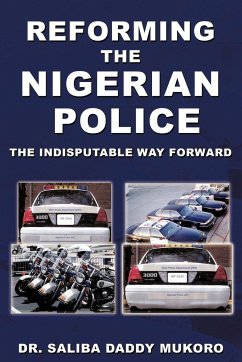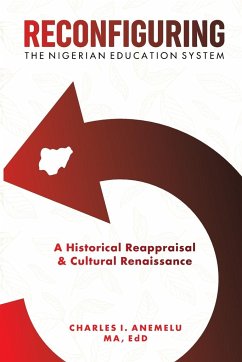
Reforming the Nigerian Police
The Indisputable Way Forward
Versandkostenfrei!
Versandfertig in 1-2 Wochen
16,99 €
inkl. MwSt.

PAYBACK Punkte
8 °P sammeln!
Reforming the Nigerian Police is a product of several years of research, teaching, thinking, and rethinking about how to design a comprehensive and effective blueprint that can be used effectively to reform the Nigerian Police, or other similarly situated police establishments in Africa characterized with similar dynamics and antecedents as the Nigerian Police. The book is designed for leaders/stakeholders interested in thoroughly, productively, and cost effectively reforming the Nigerian Police or other similarly situated police establishments in Africa. It is also designed for university stu...
Reforming the Nigerian Police is a product of several years of research, teaching, thinking, and rethinking about how to design a comprehensive and effective blueprint that can be used effectively to reform the Nigerian Police, or other similarly situated police establishments in Africa characterized with similar dynamics and antecedents as the Nigerian Police. The book is designed for leaders/stakeholders interested in thoroughly, productively, and cost effectively reforming the Nigerian Police or other similarly situated police establishments in Africa. It is also designed for university students pursuing degrees in Criminal Justice (Law Enforcement/Police Science, Courts, and Corrections), Sociology, or any of the other related Social Sciences. The book recommends starting the reform process by correcting the foundational problems of the police, for example a police force that has a colonial background will emphasize the protection of the colonial government and the suppression of the populace who are often in opposition to the colonial governments. With the attainment of self-governance, most of these police forces in Africa still maintain the colonial focus and practices. In order to effectively reform those police forces, the police focus must change to protecting the government and, at the same time, protecting the populace. Similarly, the operational style also needs to change from the reign of violence on the populace to protecting and serving the populace. Such violent police units like the mobile police, nicknamed "kill and go" in the Nigerian context, must give way to friendly crime patrol units of the regular police force. Any reform without this change of focus will be ineffective, irrespective of how much is spent on the reform efforts. This foundational change of focus is a must, and a center piece of this book. Other reform areas covered in the book include: achieving effective and operational performance related training; checking the systemic corruption and the resulting command impotence; introduction of a surge of change agents into the Nigerian Police at the Divisional Police Officers level and other levels; spatial distribution of police personnel and services across the country to achieve maximum effectiveness; redesignation of police units as per the names of the cities, towns, and villages they serve; improving the quality of police uniforms and their general appearance; the operational gains of phasing out barrack accommodations and causing the police to live amongst those they swear to protect and serve; and how to deal with the armed robbery problems.














